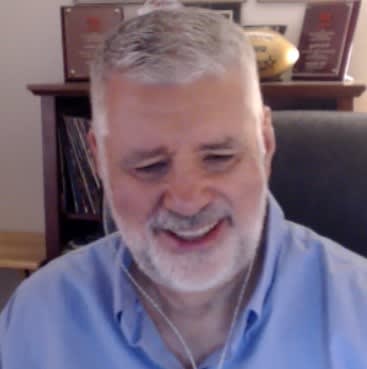SOUTH BEND, Ind. — The supplemental segment of Marcus Freeman’s elongated National Signing Day mega-press conference that was solely dedicated to transfer talk, Wednesday at Notre Dame Stadium, was sneakily seismic.
Both for how revelatory it was in speaking to the bigger picture of how Marcus Freeman plans to evolve the Irish football team’s program-building process in a college football world in a hyper-state of flux and yet how steadfast he continues to be in making sure high school recruiting is the most important element of it.
The conversation about recently committed/newly signed Duke transfer quarterback Riley Leonard alone overtly touched on three compelling threads and hinted at a fourth.

The 6-foot-4, 212-pound junior is one of six transfers the Irish added Wednesday on a day when they had all 23 of their high school prospects inked drama-free by 10:30 a.m. ET. Rivals deemed it the No. 9 class nationally, up two spots from the last cycle and four rungs ahead of former ND coach Brian Kelly’s LSU haul.
The players joining Leonard in the Irish incoming transfer class so far — with likely additions still to come next month and/or in May — are wide receivers Kris Mitchell (FIU) and Beaux Collins (Clemson), defensive end R.J. Oben (Duke), defensive back Jordan Clark (Arizona State) and kicker Mitch Jeter (South Carolina).
Beyond what Leonard might do on the field in 2024, assuming he beats out the three other scholarship QBs slated to be on Notre Dame’s spring roster (Steve Angeli, Kenny Minchey, CJ Carr), is what he symbolizes.
In terms of:
• The Notre Dame administration finding a happy medium with a less-restrictive — but still principled — incoming transfer policy that provides a significantly bigger pool of transfer candidates than in previous cycles. They’re also defining who can be in the “take” pool more expeditiously, eliminating the possibility of ND losing a transfer because of red tape.
Previously, anything but a grad transfer or a freshman in good standing was much more likely to draw a hard no than an eventual yes. Riley and Collins, current juniors with degree work still left to do, may not have threaded the admissions needle as recently as last winter.
“As you look at Riley, he’s a great example of Notre Dame continuing to find ways to get — maybe it's not a graduate transfer — but get the right guys in here,” Freeman said. “And that's all work. Our dialogue continues to be: How do we make sure that we have a faster process to admitting or denying the right guy? Admitting or denying the right guy or denying a guy they don't feel will fit here.
“And that's what you get with Riley, who’s not a graduate. They looked at his transcript and said, ‘You know what, he's going to be a fit here.’ And they admitted him as soon as they could. So, I see a lot of progress there with that situation. I'll continue to push, but also I understand that there's standards that we have that have to make sure I understand. And I'm OK with that.”
• That Freeman is committed to adapting his offense to his personnel, whoever the next offensive coordinator might be, and not trying to retrofit a quarterback into a rigid vision of the Irish offense.
Where it pertains to Leonard, with a true dual-threat skill set that’s very different from Sam Hartman’s, is that the Irish coaching staff was neither attracted to the Duke QB because of that running dimension, nor in spite of it.
“He was the best quarterback that we believe was in the portal,” Freeman emphasized. “And, to me, you get the best players first. And then you say, ‘OK, how do we tailor what we do around those guys?’ That is so important.
“So, we weren't looking for a pocket passer. We weren’t looking for a dual-threat guy. We said, ‘As we look to take a quarterback to add to this program, who's the best one that fits this place?’ We always say that. And then how do we tailor what we do offensively around those guys?
“And so, I think that's the situation with Riley.”
• That Freeman’s long-term plan is to develop quarterbacks from within to eventually top the depth chart, not an annual plunge into the portal for a starter, as the Irish have done in 2021, 2023 and presumably for 2024.
“I don't want to go into the portal every year and get a quarterback,” Freeman said. “I want to continue to try to find a way to keep the quarterback room at four, knowing that if somebody transfers, you'll have three, like what happened last year.
“But I believe in [quarterbacks coach] Gino Guidugli and our developmental quarterbacks. I've seen what he's done with Steve Angeli and Kenny, and what he's going to do with CJ. I can't say I'm never going to go into the portal again to get a quarterback, because it's more of a numbers thing than anything, but I would love to make sure that we continue to develop the guys we have in house to lead this program.”
• Not addressed during the transfer portion of the press conference, but touched on during the larger high school recruits segment, was how comfortable Freeman has become in the past year in regard to Notre Dame’s place in the NIL space.
That’s largely due to THE evolution of ND’s largest NIL collective, FUND, and how it mixes Notre Dame’s values with keeping up in recruiting to and maintaining a college football roster in this very different day and age.
“I am extremely pleased with what our collective, the FUND, has done,” Freeman said, “what they continue to do, the investments in our athletics program and the ability to continue to compete — not just in the present, but in the future as NIL continues to change. There will be change, I’m sure, in the future. But the group is committed to making sure we are in a position to compete for championships.”
Transfer tidbits
• Freeman confirmed that the projected role for Duke transfer R.J. Oben is to slide into the spot at field end vacated by former Ohio State transfer Javontae Jean-Baptiste once he’s competed in the Sun Bowl.
And Freeman also shared an unsolicited endorsement of Oben by outgoing Notre Dame unanimous All-America offensive tackle Joe Alt.
“I remember being in a car with Joe Alt coming back from a party,” Freeman related. “And he said, ‘Who are you guys recruiting?’
“I said, ‘We’re going after the kid from Duke [Oben] that just got in the portal.’
“He was like, ‘He’s probably the best one I went against.’ And I said, ‘I’m good.’ With Joe Alt saying that, I’m good. That confirms what I saw on film. And so, we're excited to get R.J. here.”
• It’s not that Notre Dame was overly aggressive when opting to try to convert on fourth down or particularly unsuccessful at it in 2023.
The 15 tries by the Irish are 112th out of 130 in terms of frequency of shunning a field goal attempt or a punt, and they were successful 60% of the time, which is 40th-best. But it’s the six of those 15 that the Irish didn’t convert that stand out so much.
To Freeman too — which is why he was so convicted to pursue and elated add a veteran kicker in Mitch Jeter, who’s only missed two of his 25 field goal attempts the past two seasons,
“I think in the two years that I've been head coach, the one thing I’ve kind of changed my philosophy on is taking points,” Freeman said of a promised shift in thinking for 2024. “It's important to get points on the board, and you can be so greedy that you're turning down opportunities to kick field goals.
“We have a kicker that you believe is the best — the best out there — and it's a great feeling for an offensive coordinator and head coach to say, ‘OK, let’s take the points here and kick it.’”
• Four of the six transfers ND signed Wednesday and the vast majority of those added in previous cycles were all grad transfers. Which makes the 4-for-40 pitch Freeman routinely makes to high school recruits in need of some tweaking.
Which Freeman was ready for.
“I think Notre Dame offers you a chance to increase your value as a person, when you associate yourself with this university,” he said of the grad transfer conversations. “The thing you see with the majority of grad transfers is: I try to tell them the NFL, as you look at it from a 500 level, they're not looking to pay guys for 10 years.
“They want to sign you to a three- or four-year contract. And if they can get the next guy, as a rookie, to do the same thing you're doing, then they're going to go get the rookie. And so, what I try to tell them is: You want to create as much value as you can.”
And he tells that same thing to his own players on the fence about leaving for the NFL early — players like nose guard Howard Cross III, defensive tackle Rylie Mills and linebacker Jack Kiser, all of whom deferred the NFL dream and already have their degrees (and some with more than one).
“If you're an NFL prospect, you want to create as much value as you can in terms of where you're going to get drafted at,” Freeman said, “because that's more guaranteed money. If you come back and create more value for yourself and you're drafted in a higher slot, you get more guaranteed money.
“So, that's why I encourage — if you think you can come back and increase your draft stock, come do it, because you're giving yourself more guaranteed money, greater value in terms of the NFL, because the second contract isn't guaranteed. There's a reason why the average length of an NFL career is less than four years.”
---------------------------------------------------------------
• Talk with Notre Dame fans on The Insider Lounge.
• Subscribe to the Inside ND Sports podcast on Apple Podcasts, Spotify, Google Podcasts, SoundCloud, Podbean or Pocket Casts.
• Subscribe to the Inside ND Sports channel on YouTube.
• Follow us on Twitter: @insideNDsports, @EHansenND, @TJamesND and @cbowles01.
• Like us on Facebook: Inside ND Sports
• Follow us on Instagram: @insideNDsports
